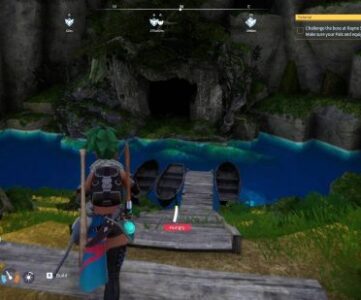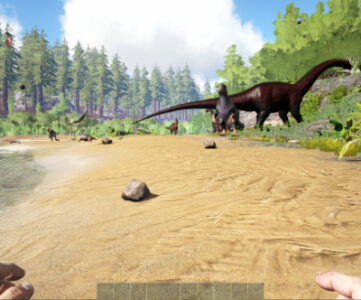[ad_1]
Our Verdict
Odyssey is a better, and certainly bigger, Assassin’s Creed game than any before it. The sheer number of moving parts can be intimidating but this is a special adventure that must be savoured.
In the Odyssey – Homer’s, not Ubisoft’s – Odysseus is given an ox-skin bag containing all the winds of the world, buffeting and rolling over each other in endless activity. Similarly, Assassin’s Creed Odyssey is bursting at the seams with new systems that bluster against each other, creating a world fit for epic adventure as they do.
Within this turbulence I’ve started, and decided, battles of huge scale. Have hunted down a shady cult, while trying to shake off rather persistent mercenaries. And, er, climbed Zeus’ massive – and magnificent – meat and two veg.
Assassin’s Creed Odyssey is similarly gargantuan. When I fully zoom out and pan across the countless land masses that make up Ubisoft’s Ancient Greece, my starting island of Kephallonia becomes a mere speck, just a drop in a vast ocean. Odyssey is an epic that lives up to its name. It’s also the best Assassin’s Creed game yet.
Greece is the word
In Assassin’s Creed’s last outing, Ubisoft succeeded in creating a gorgeous rendition of Egypt despite the limited colour palette available to a land dominated by tan desert. Greece allows the studio access to a full spread of colour, terrain, and plantlife – it looks sumptuous. Sailing through bright blue water and swimming to an island with the vibrant reefs visible beneath the surface just never gets old. Out of the wild and into the cities, the sprawl of metropoli (and acropoli) is recreated with a devotion to historical detail. All of which provides plenty of photo mode fodder.
Yet, while the Mediterranean world of Odyssey is beautiful on the surface, beneath it is being torn apart by the Peloponnesian War. Like Odysseus between Scylla and Charybdis, you are caught between the Athenians and the Spartan armies that battle across Greece. The vast map is broken down into districts, each controlled by one of the two armies, and you’re free to side with either in the conflict. While your own story provides plenty of intrigue, political skulduggery, and family drama, diving into the systemic conflict of the two warring factions is a game in itself.
Each district is commanded by a faction leader who sits safe in their city stronghold. You can attack them outright if you wish but their guard will be up. Instead, you can undermine their power by stealing war funds, burning supplies, and killing soldiers dotted throughout the region. The weaker the leader becomes, the easier they will be to dispatch, which gives you the chance to trigger a Conquest.
In Conquest battles you take to the battlefield and viciously scrap amid hundreds of soldiers. The sense of scale is immense as the chaotic horror and gore of war cascade around you. You must pick your way through the conflict, killing the captains and champions of the enemy army, each kill bringing the battle closer to its end. Once you’ve given the star warrior on the enemy side a good hiding, and finished off the last of the resistance, the land belongs to the leader for which you’ve been fighting. More importantly, you’re awarded a piece of epic loot. The conflict system brilliantly captures the push and pull of war, where power is balanced on a knife edge.
Kass murderer
The introduction of hitboxes and new RPG upgrade systems for weaponry marked a step up in quality for Origins but, in just a year, Ubisoft has managed to go much further, introducing revamped fighting mechanics that significantly improve the slaughter in Odyssey.
The key change is to how you allocate your new abilities. Bayek’s excursion to Egypt saw a move away from simply waiting for a counter animation – the optimum tactic in previous Assassin’s Creed games. But the pattern of dodging and parrying to build up your adrenaline meter and then unleashing power attacks grew old as the hours wore on.
In Odyssey, however, you unlock skills that you can map to a limited number of slots. Not counting your passive abilities, you can upgrade your assigned skills or swap them if there’s something more appropriate for your next fight, or if your current loadout is getting stale. This limitation injects a little choice into a setup that would, in other games, simply be a matter of unlocking every ability as you level through the game.
Assassin’s Creed’s lurch towards the RPG properly started with Origins, but Odyssey crystallises the effort – much like how the limestone that dominated Ancient Egyptian architecture, over time, becomes the marble favoured by Ancient Greek architects. Unlike the cosmetic-only skin you donned in Origins, various aspects of your armour in Odyssey can be upgraded and changed, giving you the freedom to choose a helmet, chest armour, bracers, and greaves.
Despite the reduced number of weapon types, that’s a fair amount to manage, so you’ll likely nip to your inventory every five minutes as you find better gear. Each element of your weapons and armour can be engraved with extra perks, too, which gives you a good reason to visit the local blacksmith occasionally. Of course, if you’re particularly taken with a certain armour set, you can keep it upgraded to your current level, provided you have the drachmae.
Gift of the stab
Odyssey’s expanded RPG features extend to dialogue, too. A first for the series, you now have the chance to properly weigh in on conversations to shape their outcome. At times choices can feel unnecessary as they don’t change the direction of the conversation away from its fixed end point, but it’s a welcome novelty.
Where, in Origins, I would sidle up to an NPC and tune out as they whimpered about their woes and directed me to where their loved one awaited rescue, in Odyssey I found myself far more engaged in what was being said – whether my input truly mattered or not. Moreover, you can now choose to hear additional background information during conversations – answers highlighted in yellow progress the quest, white ones give you more exposition.
Dialogue choices also helped bring me closer to Alexios. For example, more entertaining and quirky writing allowed me, when asked whether I was scared about finding some treasure near some hungry sharks, I could quip, “Who isn’t afraid of sharks?” Some options posed to me might not have turned Ancient Greece upside down, but they didn’t need to; it felt as if I was connecting with the protagonist and his story on a more intimate level than in previous Assassin’s Creed games.
I can’t say the same for the romance dialogue. Answers that lead to doing the dirty are marked with a little love heart. For purely professional reasons, I assure you, I pursued this path, which amounted to a brief bout of awkward kissing before a fade to black. The Witcher 3 or Mass Effect, this isn’t.
Ikaros of the fearless flight
Ubisoft also plays with how you navigate an Assassin’s Creed world in its new Exploration Mode. For those who have grown tired of the rash of icons across the map, Exploration Mode offers a new way to track down your objectives. Rather than simply tell you where your mission is, you’re given hints to its location. Only knowing that a mission area is somewhere south of a certain location encourages you to observe the world more closely.
On paper, Exploration Mode seems a little like the treasure map system in Origins, where you’re given some hints that point you toward rare loot. In practise, however, it’s easy work. Most of the time, you can simply go to a question mark that fits the clues and when you’re close you’ll get the prompt for your eagle, Ikaros, to scope out the area from there. It’s a step in the right direction – and absolutely “the way Assassin’s Creed Odyssey is meant to be experienced” according to the in-game description – but there’s room for a bigger commitment to this independence, and I’d like to see it embraced.
Assassin’s Creed Odyssey is the culmination of the best elements of the series. Following on from the transformative changes introduced with Origins, Odyssey is a proper RPG that is better – and more reminiscent of The Witcher 3 – than ever before. The finest elements of ship combat and exploration have made their way in from Black Flag, having been largely sidelined in Origins. And new ways of interacting with the world and its many characters have managed to wiggle their way in, too.
The result is an RPG that straddles the boundary between a single-player action-adventure title and a service game. With the episodic season pass missions on their way too, this is a game that people will be playing long into next year and – since there’ll be no new Assassin’s Creed in 2019 – beyond.
Size does not equal quality, however: Odyssey is a rich, deep, and inestimably entertaining epic, but one that could do with some of the extra fat being trimmed. Conversely, its sprawling nature means that if a particular element doesn’t tickle you, you can either dip into it briefly or skip it entirely in most cases. It makes me feel like an eight year old with access to all the pick and mix I’d like – I’m going to devour it all and probably be sick, but that doesn’t make the best gobfuls taste any less sweet.
[ad_1]






[…] Creed Odyssey. If you’re interested in taking a virtual trip to ancient Greece, give our Assassin’s Creed Odyssey review a […]